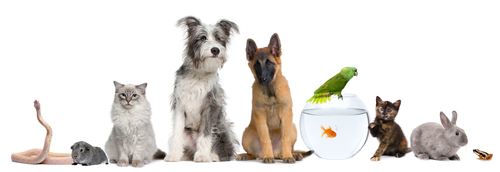Stewardship and the Blessing of the Animals

I was out on an errand last week and drove past a church whose sign out front read “Blessing of the Animals, Sunday, October 4, 1 pm.” It made me smile remembering other blessings of the animals on the Feast of St Francis.
Parents and children brought in their beloved leashed or caged pets, which might range from the expected large and small dogs and very unhappy cats to other varied species of anxious pets: snakes, frogs, hamsters, guinea pigs, actual pigs, chickens, parakeets, cockatoos, and parrots; a capuchin monkey on one occasion. One year a couple of people from just outside town drove in their two riding horses and a cow. The reluctant animals were pushed and pulled out of their trailers for their blessings, immediately after which, wrenching their reins from their owners, the three of them galloped back to and up into their cabs! The blessing of the animals can be an active, noisy, messy enterprise but which expresses the pet owners’ love and deep respect for their animals.
 |
 |
The Blessing on Feast of St. Francis
“Blessed are you, Lord God, maker of all living creatures. You called forth fish in the sea, birds in the air, and animals on the land. You inspired St. Francis to call all of them his brothers and sisters. We ask you to bless this animal. By the power of your love, enable it to live according to your plan. May we always praise you for all your beauty in creation. Blessed are you, Lord our God, in all your creatures! Amen.”
Though St. Francis is the patron saint of animals, I credit Mark Twain for my budding respect for animals. It later expanded to include insects as well. (You know my type – catching bugs inside my home and releasing them outside – when practical.) This was one of my most life-changing epiphanies and it deepened my spiritual development.
 Mark Twain wanted people to stop thinking of animals as intrinsically “good” or “bad”: a wolf is bad; a song bird is good. No, all animals are as God made them, he felt. They behave as nature has taught them for their best survival. A young friend of mine has resignedly referred to the mischief of her cat, scratching the stuffing out of the corners of her furniture and bed, as “a kitty
Mark Twain wanted people to stop thinking of animals as intrinsically “good” or “bad”: a wolf is bad; a song bird is good. No, all animals are as God made them, he felt. They behave as nature has taught them for their best survival. A young friend of mine has resignedly referred to the mischief of her cat, scratching the stuffing out of the corners of her furniture and bed, as “a kitty ![]() thing.” Lions will eat weaker animals or livestock when they are starving: that is a “lion thing.” Migrating geese will mess all over a grassy area of park next to a pristine pond on their way north or south, and never mind what pigeons and seagulls do; cornered animals bite and scratch and kick; scorpions sting; mother bears protect their young by – killing you!
thing.” Lions will eat weaker animals or livestock when they are starving: that is a “lion thing.” Migrating geese will mess all over a grassy area of park next to a pristine pond on their way north or south, and never mind what pigeons and seagulls do; cornered animals bite and scratch and kick; scorpions sting; mother bears protect their young by – killing you!
 Darwin and Twain both believed animals are not bad or evil. They are different in how they socialize, who their enemies are, what and how they learned from their mothers (and fathers in some species). They are are obeying instincts wrought in their various sized brains over thousands or millions of years through many
Darwin and Twain both believed animals are not bad or evil. They are different in how they socialize, who their enemies are, what and how they learned from their mothers (and fathers in some species). They are are obeying instincts wrought in their various sized brains over thousands or millions of years through many  climates and terrains. If their instinctive characters have changed from the way God made them to be, it could be from the impact of human beings on their lives and environments. Twain didn’t believe that humans were the crown of creation. Rather he put them at the nadir of creation: “the lowest animal.” He is credited with saying,
climates and terrains. If their instinctive characters have changed from the way God made them to be, it could be from the impact of human beings on their lives and environments. Twain didn’t believe that humans were the crown of creation. Rather he put them at the nadir of creation: “the lowest animal.” He is credited with saying,
“Man is the animal that blushes.
“He is the only that does it—or has occasion to.”
Mark Twain taught me I could think about animals very differently from what I had previously understood. And the influence of his writings and lectures made an impact on society and how animals were treated in his time and still do.
A delightful new book is out named Mark Twain’s Book of Animals by Shelley Fisher Fishkin. The following is from a review:
In her new book entitled Mark Twain’s Book of Animals, Fishkin, a Stanford
English professor, examines how Twain’s fascination with, and advocacy for,
animals reveals itself in many of his works. In the book’s introduction and
afterword, Fishkin suggests that Twain’s works played a pivotal role in raising
Americans’ concerns about cruelty to animals and the exploitation of non-human
animals by humans. . . .
In particular, Fishkin found that that Twain was affected by Darwin’s idea that
man and animal were in reality, much more similar than people liked to believe.
“The topic he was dealing with was emotional and intellectual continuities between
humans and non-human animals. Darwin wrote that the lower animals were capable
of experiencing the same emotions as people and that they were capable of
rudimentary reasoning, as well. ”. . .
From “Twain’s Tales Reveal Ardent Animal Welfare Advocate in their Author“
by Humanities at Stanford
Now I, being chronologically disadvantaged, couldn’t read this book before the writing this blog, but I have it on order. Nor could I write this blog before St. Francis Feast Day. Also belatedly, I’d like to draw attention to the Day of Prayer for the Care of Creation, declared by Pope Francis to be September 1st – the initial such Day being last month.
God made us stewards of our world. And arguably the first step in stewardship is respect. St. Benedict would agree with this, I believe. With God the Creator, prayer can be one big way we begin to develop that respect for Creation.
God our Maker, bless us so that we may
be blessings to each other,
and to the animals,
and to all your beautiful creation.
Oh, let it be so! Amen.
